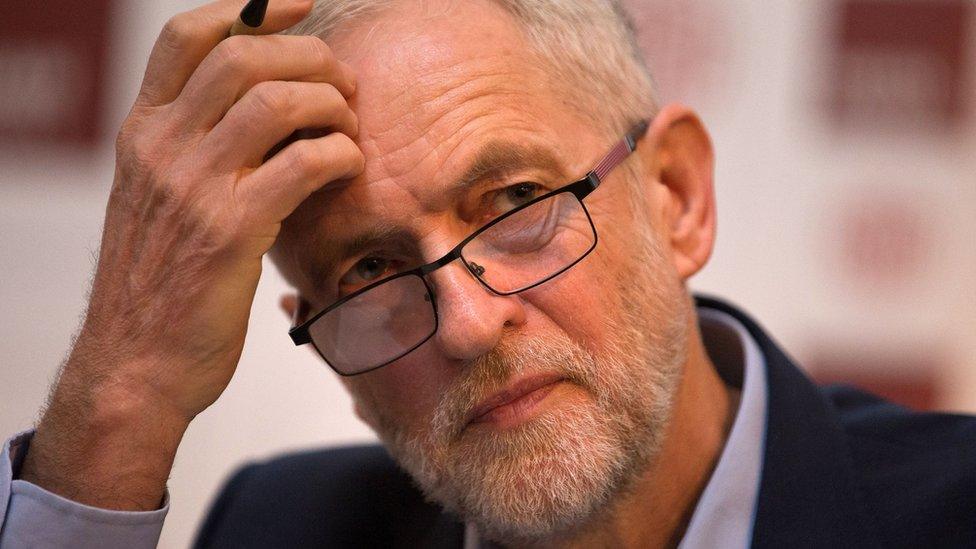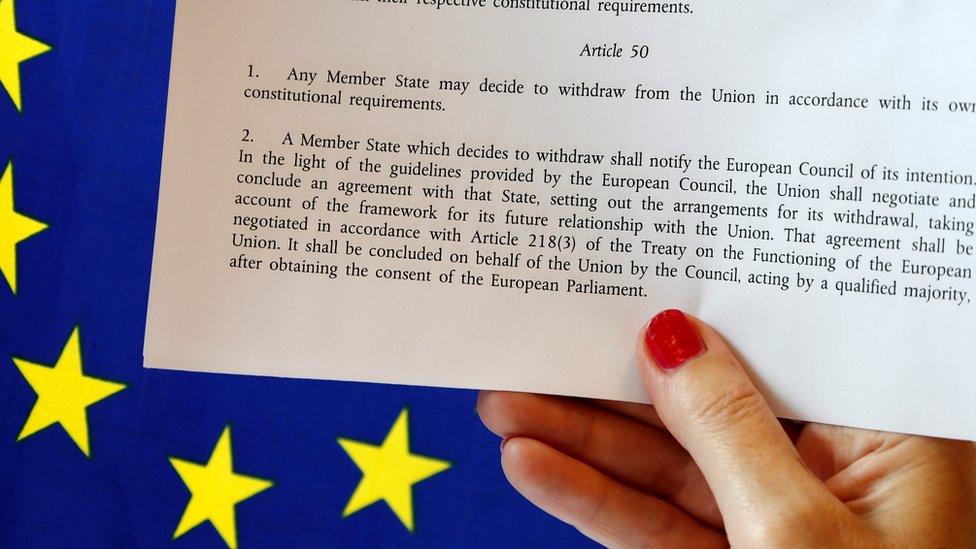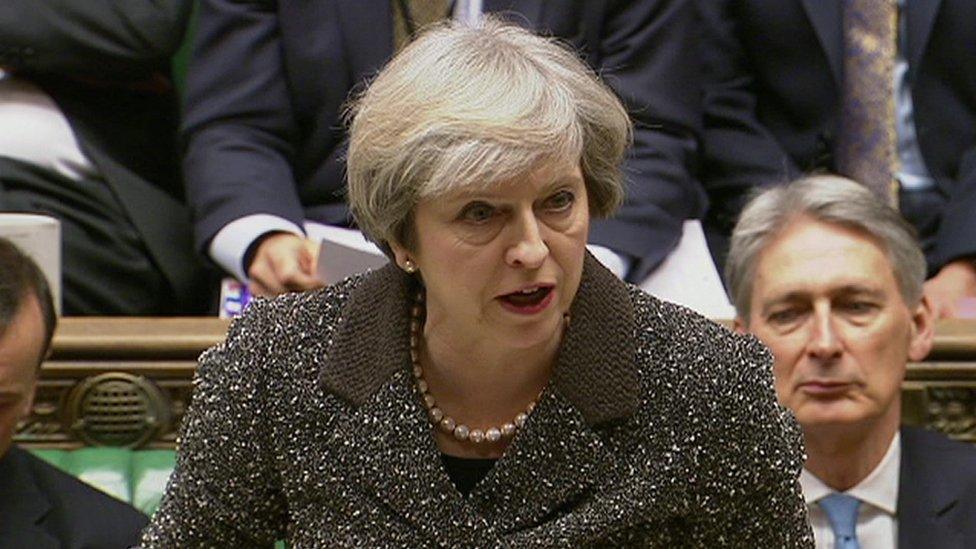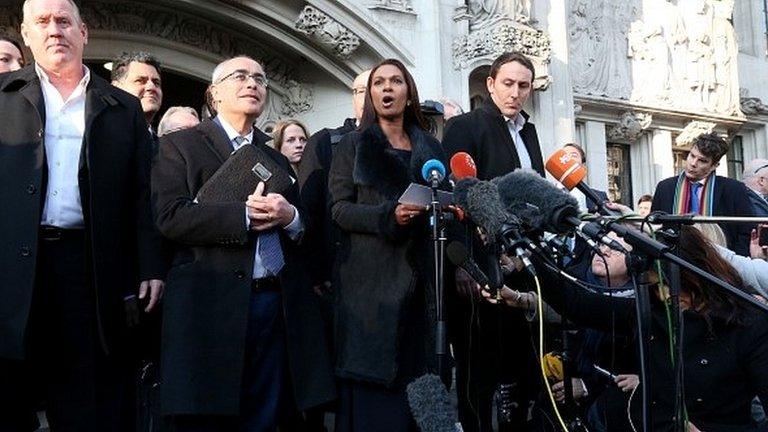Labour's Brexit dilemma
- Published

Labour's Brexit bind is not hard to grasp.
The vast majority of Labour MPs campaigned to keep Britain in the EU. But most now represent constituencies that voted to leave.
And as Parliament prepares to vote on triggering divorce talks with Brussels, Labour MPs are being ordered to approve the start of Brexit by a party leader who spent his backbench career ignoring similar demands for discipline.
These are agonising days for a parliamentary party struggling to maintain a coherent position on the biggest issue facing British politics for a generation.
Three-line whip
Let's start with Jeremy Corbyn's decision to impose what, in parliamentary parlance, is called a three-line whip.
As far as the political parties in Westminster are concerned, MPs are not sent to Parliament to carefully weigh up each issue and vote according to their own judgement or conscience.
No, they are there to vote as their party leadership tells them to. Over the weekend, all MPs will receive a letter from their party's whips office telling them how to vote on various Bills before the Commons next week.

Article 50 of the Lisbon treaty sets out how countries can leave the EU.
The most important by far will be the Second Reading of the bill to trigger Article 50 of the Lisbon Treaty.
It will not be the end of the parliamentary process for the Bill (a Committee stage will follow the week after and the Lords needs to approve it too) but it's a big moment.
And in the letter Labour MPs will receive, the name of the bill will be underlined three times. That means they must vote as their party managers instruct - no ifs, no buts.
In this case, they must vote to support the government's plan to trigger Article 50 by the end of March.
Personal discomfort
It's an instruction that gives Labour MPs no wiggle-room or freedom to vote according to their conscience. Of course, Labour MPs can choose to ignore the instruction but for backbenchers that would normally mean a big black mark against their name by the party whips and for front benchers such insubordination would mean resignation or the sack.
So why has Mr Corbyn decided to issue a three-line whip on Article 50?
First, he has made it clear Labour will respect the result of the referendum and not block the start of Brexit in Parliament. Mr Corbyn believes it is imperative his party has a clear position on the issue.
For him personally, triggering Article 50 may not cause too much discomfort. He campaigned for Remain but has been an EU sceptic most of his political life.
But there are obvious political considerations at play too. Roughly two thirds of parliamentary constituencies represented by Labour MPs voted to leave the EU.

UKIP leader Paul Nuttall hopes to gain from Labour's position on Brexit.
As the shadow home secretary Diane Abbott said: "You have to remember how this looks to people in post-industrial Britain, former mining areas, the North, the Midlands, south Wales - it would look as if elites were refusing to listen to them".
Swathes of Labour's traditional working-class heartlands voted to leave the EU and the leadership believes the party must stand firmly behind their decision.
There are imminent electoral tests for Labour too: By-elections in Copeland and Stoke on Trent.
'Capital of Brexit'
Stoke voted to leave the EU by 69.4% and UKIP's leader Paul Nuttall is running in the city he is describing as the "capital of Brexit".
If the Labour leadership was to look flaky on the question of triggering Brexit, the party could give up on holding Stoke Central now.
And as Labour MPs who represent similar seats look ahead to the next general election they will make the same calculation.

Bristol West MP Thangam Debbonaire is expected to defy her own whip.
I've spoken to former Labour ministers who passionately believe that leaving the EU will be bad for Britain, but feel they must respect the referendum result.
And if they want to keep their seats, they have little choice.
However, there is a second category of Labour MPs with a very different perspective.
According to BBC research, about 70 Labour MPs represent constituencies that voted to remain in the EU.
Going feral?
Just four of those MPs campaigned to leave (including Kate Hoey in Vauxhall and Gisela Stuart in Birmingham Edgbaston) which means dozens of Labour MPs who wanted to keep Britain in the EU represent seats that voted the same way.
And many of them look set to defy Jeremy Corbyn's orders on Article 50. Even two Labour whips - Jeff Smith and Thangam Debbonaire - have said they will refuse to vote in favour of the Article 50 Bill, in a bizarre show of parliamentary self-flagellation.
It seems likely a number of front bench and even shadow cabinet Labour MPs will do the same. The question is, whether Mr Corbyn sacks them or allows some tacit elasticity.
As one Labour MP said to me this week, party discipline on the issue is rapidly breaking down and MPs were going "feral".
Mr Corbyn rebelled against the Labour whip 428 times during Labour's years in power and it's clear many of his MPs aren't cowed by calls for party discipline now.
Remember too, polls conducted before the referendum showed a large majority of Labour Party members were strongly in favour of remaining in the EU. They will be making their views felt at constituency meetings.
In the end, the government will get its Article 50 Bill through Parliament with ease. Even if dozens of Labour MPs join other opposition parties and vote against the bill or abstain, the government seems certain to secure a hefty majority.
But the choice being weighed up by Labour MPs goes to the heart of what Members of Parliament are for.
In this case, is it to endorse the decision of a national referendum? Is it to reflect the wishes of their constituents? Is it support the position of their party in Parliament?
Or is to judge, individually, what they think is in the best interests of the country? Perhaps not since the Iraq vote in 2003 have Labour MPs faced such a testing decision.
- Published25 January 2017

- Published24 January 2017
